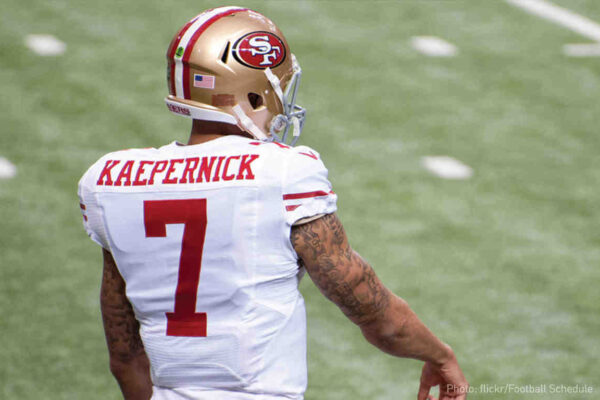The following was adapted from a speech given at the Presidential Leadership Scholars Program.
Three weeks ago, Ben Zahn, the Mayor of Kenner, Louisiana, issued a policy banning booster clubs who use the city’s recreational facilities from purchasing Nike products.
The Mayor didn’t like the fact that Colin Kaepernick, who had inspired the #TakeAKnee movement to protest racial injustice and police brutality, was the face of Nike’s 30th anniversary “Just Do It” campaign.
Since then, a number of other cities have followed suit, attempting to use government power to suppress one side of a public debate – and violating the First Amendment in the process.
Mayor Zahn rescinded his unconstitutional ban within hours of receiving a letter from the ACLU of Louisiana demanding he do so.
Yet, this issue is far from resolved. With the death toll of police-involved shootings continuing to rise and athletes continuing to exercise their constitutional rights to protest – this debate isn’t going anywhere, and neither are we.
The ACLU has long touted a history of nonpartisanship and has worked to protect the civil rights and liberties of all people.
The politics mean nothing. The First Amendment’s Right to Free Speech, Freedom of Political Expression, and Freedom of Assembly mean everything.
Even still, more than just the First Amendment is at stake in this conversation. We are having a national debate about patriotism and protest. Loving this country and critiquing her. Honoring this land and owning its checkered past. At the heart of this debate are two issues at the heart of the American experience: patriotism and protest.
Patriotism. It’s not hard to love this country, even with all her imperfections. I think of those who served proudly, in battalions and platoons modeling diversity, for my defense and yours. I think of those who lost spouses and partners for the cause of our common defense. And I am grateful for their sacrifice. And I feel pride in their service. Our union is more perfect because of them.
Protest. It’s hard not to demand more from this country. The fact remains that people of color are not even safe in their own homes. The alarming number of civilian lives lost at the hands of police provide a sobering glimpse into the deeply fractured relationship between law enforcement and communities of color, but they don’t adequately depict the depth and breadth of injustice rife in our criminal legal system.
And they don’t illuminate a history of “otherness” experienced by people of color—for generations--in nearly every walk of life in this land.
The writer James Baldwin stated: “I love America more than any other country in this world, and, exactly for this reason, I insist on the right to criticize her perpetually.”
What if we challenged ourselves to conceive of patriotism in the way Baldwin envisioned it? What if we believed those who march in the streets, stand in solidarity on the steps of courts, and at the doors of the Legislature, do so out of their deep and abiding love for this country. How would our collective consciousness be raised if we could all agree that dissent is truly patriotic?
We are in a moment in our history where marginalized people are rising up and resisting in every corner of our society. The Me Too Movement; The resurgence of the Women’s Movement, Human Dignity movements resisting Family separation and the Muslim Ban, the Parkland Florida activists, the LGBTQ and Black Lives Matter movements. The list goes on.
We kneel with Kap because we know that racism won’t cure itself. We stand with sexual assault survivors because allowing a culture of sexual violence and abuse to go unchecked in our society doesn’t just hurt women, it hurts us all. We March with the young people from Parkland, Florida because walking into school shouldn’t be a life or death choice for our children. We fought in the Court for marriage equality because love and commitment are love and commitment. We shout Black Lives Matter because life, liberty and the pursuit of happiness are our birthrights, too.
Protesting injustice is the oldest American tradition there is. Ever heard of the Boston Tea Party? Dissent is patriotic. And whether you’re a worker standing on a picket line, a group of citizens protesting the nomination of a Supreme Court Justice, even a patriot taking a knee or saluting the flag, the ACLU will continue to defend those rights- your rights– in communities, at the capitol, and in court if we have to. Even when we disagree with you.
###


